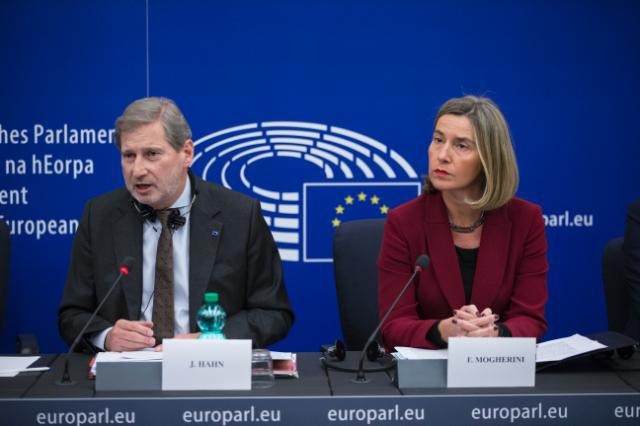The European Commission adopted yesterday a strategy for its engagement with the six countries in Western Balkans and the enlargement process leading eventually to their membership in the EU. Without committing to the year 2025 as accession date for all of them, it indicates a possible time perspective and foresees that at least Montenegro and Serbia could be ready for membership by then.
When the Juncker commission was appointed in 2014 it announced, as a sign of enlargement fatigue, that there would be no enlargement during its five-year mandate period.
Yesterday (6 February) European Commission president Jean-Claude Juncker stated that, “Investing in the stability and prosperity of the Western Balkans means investing in the security and future of our Union.”
He added: “With strong political will, real and sustained reforms, and definitive solutions to disputes with neighbours, the Western Balkans can move forward on their respective European paths. Whether this is achieved will depend on their objective merits. The European Commission will be rigorous but it will also be fair.”
But it will not be easy for the Western Balkans countries. They need to implement comprehensive reforms in crucial areas in order to meet the EU membership criteria and in their own interest,
The Commission stresses that the rule of law, fundamental rights and governance must be strengthened significantly. Judicial reforms, the fight against corruption and organised crime, and public administration reform need to deliver real results and the functioning of democratic institutions need to be seriously enhanced.
Economic reforms must be pursued with vigour so that structural weaknesses, low competitiveness and high unemployment rates are addressed.
Equally important is that all countries must unequivocally commit, in both word and deed, to overcome the legacy of the past, by achieving reconciliation and solving open issues, in particular border disputes, well before accession to the European Union. Normalization between Serbia and Kosovo is a condition for their advance towards EU.
The strategy paper singles out Montenegro and Serbia, the only two countries with which accession talks are already under way, as the “frontrunners”, while the other countries need to catch up in varying degrees.
According to EU sources, Albania - which attained candidate statues in 2014 - needs to meet remaining key priorities for its judiciary. Bosnia and Herzegovina has a good chance of gaining candidate status if it continues its track-record in state building. Kosovo took an important step last year when it signed a so-called stabilization and association agreement with EU.
The elephant in the room seems to be Macedonia or the former Yugoslav Republic of Macedonia as it is called by EU because of the unsolved name issue with Greece.
Macedonia became officially a candidate country already in 2005 but the start of formal negotiations and opening of acquis chapters, as the Commission has recommended in the past, have been vetoed by Greece because of the name issue. As a result, Macedonia has been backsliding in its reform process.
EU continues to rely on an UN-led process to overcome the dispute and is apparently not willing to use its leverage or postpone the solution until the end of negotiations.
However, to overcome the obstacle of current and future Member States who can block the accession of Western Balkans candidates, the Commission announced that it will present possibilities to further enhance the use of qualified majority voting in the European Council in the third quarter of 2018.
The core of the strategy is six so-called flagship initiatives or packages of specific actions that the EU will take over the next years to support the transformation efforts of the Western Balkans. These initiatives target specific areas of common interest: rule of law, security and migration, socio-economic development, transport and energy connectivity, digital agenda, reconciliation and good neighbourly relations.
Public administration reform remains an issue of paramount importance in the enlargement process. EU sources told The Brussels Times that it runs as a “silver bullet” in all acquis chapters where administrative capacity is needed to implement and enforce EU legislation.
That said the Commission seems to have lost an opportunity to reinforce its leverage on candidate countries by creating a separate chapter on horizontal public administration reform. A lesson learned from previous enlargement rounds was that such reform, linked to accountability, transparency and effectiveness, had not been implemented as expected.
The EU is already the most important donor and investor in the region as well as political partner of the Western Balkans. The EU is also the Western Balkans' largest trading partner with an annual total trade volume of €43 billion (2016).
Funding to prepare Western Balkans for accession will be increased gradually. In 2018 alone, €1.07 billion of pre-accession assistance for the Western Balkans is already foreseen, on top of almost €9 billion from the 2007-2017 period.
A Western Balkans Summit is due to take place in Sofia, Bulgaria (which holds the EU presidency) on 17 May where EU leaders will continue discussions and engagement with their Western Balkans counterparts.
Before that President Juncker will travel to each of the countries of the Western Balkans to deliver his message: “keep reforming and we will keep supporting your European future."
M.Apelblat
The Brussels Times

